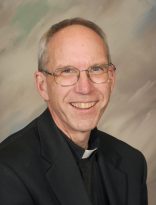Isaac would be 47 now. I first met him in Winona, where he was a second-grader and I was a seminarian teaching religion to their class once a week.

It was around Halloween, so large bags of individually-wrapped candy were every-where. I bought a bag with enough so each child would receive one – Milk Duds, I think – and made my plan.
I read John’s familiar story of the multiplication of the loaves to them, carefully pointing out the young boy with the bread and fish who shared them to provide what was needed for Jesus to do this miracle. I then chose Isaac at random and presented him the bag. I asked the leading question: “So, what would you like to do with these?”
Isaac immediately shoved them in his desk, slammed the lid and draped himself protectively over it. Hmm, I wasn’t expecting that.
I stammered out some gentle suggestions and invitations to share like the boy in the Gospel, to consider what Jesus teaches, to “do unto others,” but nothing changed his insistence that “it’s mine!” As lesson plans go, it was a memorable flop.
Maybe Isaac relented later that day; perhaps he is today a beloved philanthropist in his community. He may not have followed my lesson plan about the Gospel, but I sure learned something about human nature.
Since 1967, the Minnesota Catholic Conference has been the public policy voice of the Catholic Church in Minnesota. MCC supports the ministry of our state’s Catholic bishops by working with political and community leaders to shape legislation that serves human dignity and the common good, educating Catholics and the public about the moral framework to consider public policy choices, and mobilizing Catholics to be heard in the public arena.
The range of issues and proposed legislation is vast, and the MCC is small. Our bishops study and discuss a broad list of political concerns (locally, nationally and globally). Part of their effort is to help form Minnesota voter’s consciences on selected issues of strategic importance that are before state Legislature.
This year, several matters rise to the fore. These include among others:
- Opposing physician-assisted suicide that would involve the medical profession in taking rather than preserving life, put vulnerable persons at risk and place financial considerations over the needs of the sick and those dependent on the care of others.
- Opposing the attempt to add abortion to the long-proposed and often-fluid “Equal Rights Amendment” first discussed in Congress in 1923.
- Concern with the expansion of sports betting and the potential impact on gambling additions and strained family budgets.
- Opposing mandated insurance coverage of in vitro fertilization or other fertility interventions contrary to Catholic teaching on the dignity of marriage and procreation.
- Positive support for mothers to purchase needed baby and childcare items exempt from taxation.
- Reasonable protections for children and youth in social media algorithms that have enormous power to exploit and misinform those whose sense of identity and responsibility are in critically formative years.
What do all these have in common? It’s easy to answer that in familiar Catholic terms: the human person, made in the image of God with inviolable dignity and called to full selfhood through love, given and received.
At the heart of every social question is how we live together responsibly and charitably, together seeking the common good to allow every individual access to what is needed to live a fully human life.
Granted, such language sounds abstract. But Isaac’s crinkly bag of Milk Duds was very real. Of course, he was free to do with them as he wished – I made that clear in handing them over. But when we drape ourselves protectively over individual gain without considering the impact on others who are fundamentally our classmates in the school of life, we are all deprived of something that could have been.
Practical solutions to complex social problems are not simple or obvious, and people of good will may disagree. Sometimes progress is gradual and seeking compromise on steps to get there is prudence, not surrender. Searching for the best answers can still be done with respect, civility, common courtesy and sincere prayer.
Some think the Church should stay out of politics. If that means that we are to rise above partisanship and corrosive divisions, they are correct. But if it means confining Catholic life to prayer and piety alone, we simply cannot do that without failing as disciples of Jesus.
Isaac missed the lesson, but “do unto others as you would have them do to you” is intrinsically political in the classic sense: that as persons made in the image of the Trinity, caring about correctly arranging our relationships with others is unavoidable. God is a communion of persons who eternally live together in love. This is our truest potential as well.
That’s something to ponder over a shared box of Milk Duds.
—
Feature image courtesy of Mary Barron-Traut, freelance photographer.























I appreciate Fr. Tom’s ethics articles! This one also helped me think of the importance of human dignity as central within Catholic Social teaching. I also got hungry for Milk Duds!